The latest news from the Centre for Business Research

Research centre news
Supervision award won by CBR director Professor Simon Deakin
Professor Simon Deakin, Director of the Centre for Business Research (CBR), awarded the 2023 Cambridge SU (students' union) prize for Postgraduate Research Supervision.

Research centre news
Humanising the migration crisis
The ongoing refugee and asylum seeker crisis in Europe and the UK is an opportunity to strengthen public health, the economy, labour markets and social cohesion. In the media and political hubbub surrounding the crisis, the personal stories, mental health and wellbeing of migrants, refugees and asylum seekers are absent. How can we design front-line mental health services for refugees, asylum seekers and local populations at risk in the UK?

Congratulations to Graham Gudgin, Honorary Research Associate at the Centre for Business Research (CBR) at the University of Cambridge Judge Business School, for receiving a Commanders of the Order of the British Empire (CBE) in the 2023 New Year Honours list.

We are delighted to announce that Dr Giorgio Caselli has been promoted to Senior Research Fellow with effect from 1 January 2023. Congratulations Giorgio!

Governance, economics and policy
How to tackle the UK’s muddled and ineffective policy for growing the innovation economy
The UK needs an ‘Independent Office for Innovation and Industrial Policy’ similar to the Office for Budget Responsibility, says submission by Cambridge Judge Business School expert at the request of the House of Commons Select Committee on Science and Technology.

Insight
A look at marginalised communities: what Cambridge Judge research and initiatives can teach us
In this special insight article, we look at some of the work done at Cambridge Judge to highlight issues affecting the marginalised and point a way forward to solving them, and we also talk to some of those involved in these important initiatives.
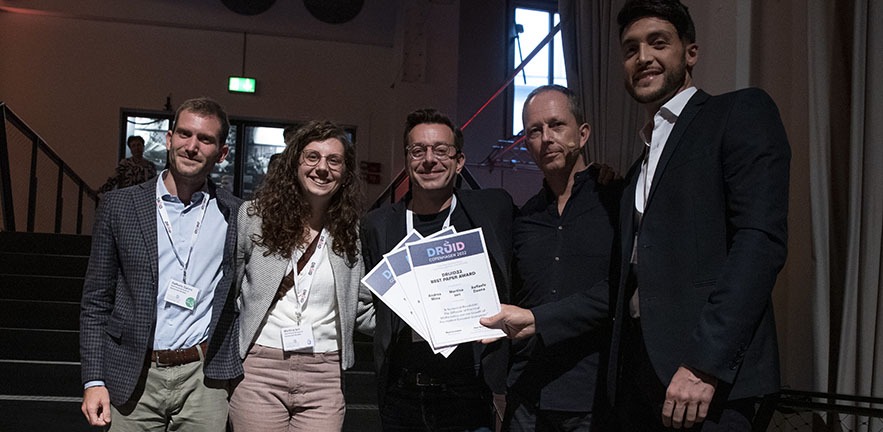
A new, prestigious international award for a Centre for Business Research (CBR) researcher.
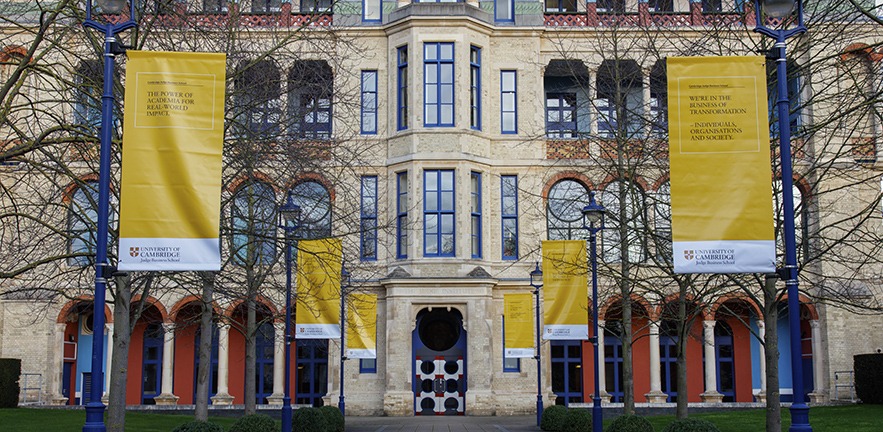
Since the onset of the COVID-19 (coronavirus) pandemic, the International Monetary Fund (IMF) has reasserted its role as the world’s leading financial firefighter.

Interactions between UK businesses and universities are broad based and beneficial, but are being held back by firms' lack of capacity and information to tap this key resource, says a new report co-authored at Cambridge Judge Business School.

Renationalisation is not the solution to the current supply and pricing issues in the energy market, Professor Michael Pollitt of Cambridge Judge says in a new podcast.

R&D study by David Connell of the Centre for Business Research at Cambridge Judge Business School is cited by UK Chancellor of the Exchequer Rishi Sunak in a high-profile lecture.

Lebanon’s health services should be given far greater priority in economic recovery policies by donor governments, says new report co-authored at the Centre for Business Research at Cambridge Judge Business School.

Insight
Gaza health care
Improve information flows and build cooperation between stakeholders in the health sector in Gaza to address continuing humanitarian needs, says report from the Centre for Business Research at Cambridge Judge.

Insight
Industrial policy failure
The UK's £7.3 billion flagship research and development tax credit scheme is failing to stimulate the additional spending required to meet the Government's R&D target, concludes a new report from the Centre for Business Research at Cambridge Judge Business School.

Insight
Governing catastrophes
Re-learning how to manage risk can be a template for the future governance of crises, say academics from the Centre for Business Research at Cambridge Judge Business School. This article, which originally appeared on the website of the University of Cambridge, is by Simon Deakin, Professor in the Faculty of Law and Director of the Centre for Business Research (CBR), and Dr Gaofeng Meng, Research Fellow of the CBR specialising in property law, with particular reference to Chinese law. As the pandemic crisis has played out across the world, different types of government have taken different approaches to controlling the spread of virus and supporting citizens – with different outcomes. Can we start to draw conclusions on how best to govern future catastrophic risks? In the 12 months since Wuhan Municipal Health Commission reported a cluster of cases of pneumonia from which a novel coronavirus was eventually identified, global efforts to contain it have gone from understanding SARS-CoV-2 and the disease it generates, to studying human behaviour and how the virus is transmitted. But there are some questions that virology and epidemiology alone cannot answer, such as why COVID-19 (Coronavirus) infection and mortality rates differ so widely across countries. We now know that…

Insight
‘Underwhelming’ response
Despite G20 pledge to do 'whatever it takes', the IMF has offered only 'trivial' new funding toward a $2.5 trillion pandemic financing gap in developing countries, says new article co-authored at Cambridge Judge Business School.

Insight
Mental health
People with coronavirus symptoms more likely to have general psychiatric disorders and loneliness, says study co-authored at Cambridge Judge Business School. People who have or had COVID-19 symptoms are more likely to develop general psychiatric disorders and are lonelier, with women and young people more at risk, says a just-published study co-authored at Cambridge Judge Business School. Having a job and living with a partner are significant protective factors against general psychiatric disorders and loneliness, says the study in the journal Psychiatry Research, based on 15,530 UK respondents, which is described as the first such large-scale, nationally representative survey in a developed country. Although there has been previous research on specific coronavirus-related disorders such as anxiety, depression and insomnia, prior to this research we knew "little about the broader psychological impact of the pandemic on a wider population", says the study in the journal's September 2020 issue. "Only focusing on specific disorders underestimates the psychiatric burdens of the pandemic in more subtle forms and overlooks the needs for psychiatric care of the people who have not been clinically diagnosed," the study says. "Although the minor psychiatric disorders are often less urgent concerns of the public health policies, they are not negligible given the large proportion of the population that have been affected," says the study co-authored by…

Calls for companies to reduce working hours instead of cutting jobs help mental health and to boost the economy after the pandemic. Research co-authored at the Centre for Business Research, Cambridge Judge Business School, calls for companies to reduce working hours instead of cutting jobs to boost the economy after coronavirus pandemic. If the UK emulated short-time working programmes in countries like Germany it would help mitigate the mental health as well as economic crises caused by the coronavirus, argue researchers from the Employment Dosage project, led by Dr Brendan Burchell with co-investigators Dr Daiga Kamerade, Dr Adam Coutts, Dr Ursula Balderson and Dr Senhu Wang. Millions of UK lives have been changed significantly in the last few weeks, even those who have not been infected by the virus. Three of the most widespread changes for many working age adults have been: The loss of a job or a large reduction in working hours A shift in the place of work from the employer’s premises to homeworking Living in social isolation alone or with other members of one’s household (adults and children) who are also spending more time at home. We know from past research that any one of these can have negative mental health consequences, but the combined effects of…

A new study co-authored Dr Kai Ruggeri and Dr Tomas Folke, from the Centre for Business Research, replicates influential Prospect Theory that describes how people make choices when faced with risky decisions. In recent years, the popularity of behavioural science has been on the rise. This is in large part due to governments and businesses around the world recognising the potential for behavioural insights to improve many processes and outcomes that depend heavily on our choice as individuals. At the same time, replicability concerns in psychology, and behavioural sciences in general, gave rise to large-scale replication efforts investigating many conclusions based on well-established theories. A new paper titled "Replicating patterns of prospect theory for decision under risk" published in Nature Human Behaviour (one of the highest impact journals in behavioural science) tested the replicability of findings from one of the most cited and influential papers in this field: Kahneman and Tversky's 1979 Prospect Theory. Prospect Theory describes how people make choices when faced with risky decisions and how those choices are not always consistent with what we consider "rational". This work was so influential and impactful that it earned Daniel Kahneman the Nobel Prize in Economics in 2002, and has…

ASSET is a new short scale that evaluates financial literacy in teenagers and young adults, developed by researchers at Cambridge Judge Business School. It covers key concepts such as compound interest, risk diversification and inflation. The team carried this work out in order to improve on existing tests by involving practical scenarios that match the life experiences of young people. As a result, it goes beyond theoretical understanding of financial concepts to capture how such concepts are applied to everyday decision making. It has been widely reported that young people tend to have poor financial literacy. For example, a study involving Australian teenagers suggest that even those with good theoretical knowledge might not be able to apply that knowledge to their everyday decision-making. This is particularly problematic because the rising cost of higher education in most countries require young people to make high-stakes financial decisions that will have a long-term impact on their future. Over the past 30 years, tuition costs have increased nine-fold in England, more than four times the rate of inflation. In order to develop teaching materials and tools that empower young people to make informed decisions the ability to accurately measure their financial literacy is a…

A research project on legal systems and artificial antelligence (AI), based on collaboration between Hitotsubashi University, Japan, and the University of Cambridge, UK, has been selected for funding following a joint call by UK Research and Innovation (UKRI) and the Japanese Science and Technology Agency (JST). On 30 January 2020, Hitotsubashi University, Tokyo, and the University of Cambridge, UK, announced that they will jointly conduct research on legal systems and artificial intelligence. The Japanese Principal Investigator is Professor Mihoko Sumida of Hitotsubashi University’s Graduate School of Law, and the British Principal Investigator is Professor Simon Deakin of the Centre for Business Research and Faculty of Law, University of Cambridge. The project is one of a number of projects funded by the UKRI and JST joint call on artificial intelligence and society. This project focuses on judicial decision making as a core feature of legal systems, and examines the possibilities, risks, and limitations of its digitisation and automation. Its aim is to develop; foundational technologies for computing law and modeling legal reasoning in ways that will facilitate the introduction of AI into legal systemsthe creation of future scenarios for the implementation of AI in lawa set of ethical guidelines for regulating the use…

Insight
Privatisation and corruption
Privatisation of state-owned enterprises in IMF loan conditions can increase corruption through a 'vicious circle' of weaker institutions and increased incentives, says a new study co-authored at Cambridge Judge Business School. Privatisation of state-owned enterprises as a condition for International Monetary Fund loans can increase corruption in the developing world by limiting the capacity of state institutions to curb corrupt behaviour, says a new study co-authored at University of Cambridge Judge Business School. While IMF pressure can force developing countries to implement anti-corruption policies, privatisation as part of IMF loan conditionality reduces corruption control by creating opportunities for corruption alongside weakening state institutions, says the study just published in the journal Regulation & Governance. "While market-liberalising reforms may reduce corruption in the short term, they tend to be detrimental in the long term," says the study, which is based on 4,500 loan-related IMF documents in 141 borrowing countries between 1982 and 2014. "Overall, these results challenge the IMF's 'house view' that structural conditions are uniformly beneficial for corruption abatement." "These findings offer policy lessons regarding the design of conditionality, which should avoid large-scale privatisation, especially under conditions of weak accountability," says the study, which is based in part on research…

Insight
The IMF and ‘conditionality’
Structural conditions imposed on developing countries by the International Monetary Fund undermine their 'state capacity' for economic development, finds study led at Cambridge Judge Business School. Structural conditions imposed on developing countries by the International Monetary Fund (IMF) reduce their "state capacity" for economic development by undermining local institutions, according to a new study led at Cambridge Judge Business School, University of Cambridge. The study, published in the American Journal of Sociology, finds that conditions on privatisation, price deregulation and (to a lesser extent) public sector employment flexibility "have a significantly negative effect on bureaucratic quality" – increasing the risk of bureaucrats falling prey to special interests and narrowing available policy instruments. In addition, companies in developing countries experience more bribery by public officials when they face more structural conditions under IMF programmes, says the study, which is based on data from 141 developing countries over a 30-year period. "Our study offers important lessons for all international organisations to consider," says the study. "We now know which elements of IMF programmes are counterproductive and misguided" – those structural conditions that seek to "rapidly overhaul" domestic institutions, reducing the ability to recruit, train and retain qualified staff. The article was co-authored…

Foreign-born academics in Britain are actively engaged in both the UK and internationally, contributing greatly to UK society, says a new study of 14,000 academics co-authored at Cambridge Judge Business School. British Prime Minister Theresa May famously said that some international elites are a "citizen of nowhere", but a new academic study concludes that foreign-born academics working in Britain are highly engaged in both UK and international activities such as joint research, networking providing informal advice. The study of more than 14,000 UK academics finds that while foreign-born academics are relatively more engaged internationally than their UK-born counterparts, the absolute participation of foreign-born UK academics is greater in UK-based ("intranational") activities. The study just published in the journal Research Policy also finds that any differences in local engagement by UK-born and foreign-born academics "tend to fade out" as the foreign-born academics spend more time in the UK, while the foreign-born still keep their international engagement "premium". "This suggests with sufficient experience in the domestic context, foreign-born academics will demonstrate the same degree of 'citizenship' in terms of local engagement as their native-born colleagues," the study concludes. "Foreign-born academics often exhibit both high levels of intranational and international engagement, contrary to…

Findings dispute "guns versus butter" narrative as a major factor behind the Arab Spring. Researchers caution against uncritically applying lessons from Western nations to interpret public policy decisions in the Middle East. Research casts doubt on the widely-held view that spiralling military expenditure across the Middle East and North Africa (MENA) “crowded out” investment in healthcare and public services, leading to civil unrest that eventually exploded in the Arab Spring revolutions. The so-called “guns versus butter” or “welfare versus warfare” hypotheses – that prioritised military spending resulted in neglect of health and education, thereby creating conditions that fomented public rebellion – is considered by many experts to be a root cause of the uprisings that gripped the region during 2011. However, a team of researchers who analysed economic and security data from MENA nations in the 16 years leading up to the Arab Spring found no evidence of a trade-off between spending on the military and public services, specifically healthcare. The researchers from Cambridge and the Lebanese American University argue that much of the evidence for the ‘guns versus butter’ causal link come from analyses of wealthy European nations, which has then been assumed to hold true for the Middle…

Researchers have built the single largest dataset of employment laws – spanning more than 100 countries across much of post-war history – to look at how worker rights affect economies over decades. There's a familiar story that goes something like this: the post-war consensus was one of heavy regulation, dominant trade unions and the same job for life; then, in the 1980s, free market forces were unleashed, and regulation came to be viewed as a 'market distortion' that stifled productivity. By the start of the 1990s, deregulation was a cornerstone of the emergent 'Washington Consensus', and worker protection and unions were in steep decline. Legal reforms to 'free up' the labour market were declared a route to prosperity by international bodies such as the OECD and World Bank. Now, a decade on from a global economic crash, and the mood music may again be changing. Issues of inequality and migrant labour are destabilising politics, while all-conquering technology companies are driving new and more flexible – as well as precarious – ways of working. Last year, for the first time in a generation, both major UK parties went into an election with manifestos that argued free market forces alone were not…

New research from the Centre for Business Research (CBR) at the University of Cambridge Judge Business School questions the accuracy of measurements of the impact of Brexit on the UK economy undertaken by the Treasury and by other official and academic bodies, during and after the Referendum. The new paper, "How the economics profession got it wrong on Brexit", predicts that the decision to take the UK out of the European Union will only have a small negative impact on economic growth over the coming years, and is likely to have a minor impact on living standards. These conclusions contrast with the large negative impacts predicted by others and particularly by the Treasury. The paper is written by Ken Coutts and Graham Gudgin, who are both Honorary Research Associates at the CBR, and Jordan Buchanan of the Ulster University Economic Policy Centre. Graham Gudgin is also Chief Economic Advisor at Policy Exchange, London, visiting Professor at the University of Ulster and Chairman of the Advisory Board of the Ulster University Economic Policy Centre. Ken Coutts is also Emeritus Assistant Director of Research in the Faculty of Economics, and Life Fellow in Economics, Selwyn College, at the University of Cambridge. The…

Author of industrial strategy review of the UK Small Business Research Initiative calls for increased focus on customer-funded innovation contracts to allow founders to grow substantial UK firms. The author of a new independent review of the UK’s Small Business Research Initiative (SBRI) called today (28 November) for an increased focus in government policy on stimulating customer-funded innovation contracts so founders can build up their businesses without over-reliance on venture capital (VC). David Connell, whose SBRI review was released this week alongside the UK government’s new Industrial Strategy White Paper, told Westminster Business Forum that minimising early venture capital injections has allowed some of the UK’s most successful tech businesses to blossom. "This has enabled founding entrepreneurs to remain in control, and build substantial UK businesses rather than selling out early for the value in their technology," said Connell, Senior Research Fellow at the Centre for Business Research at Cambridge Judge Business School, whose previous experience includes technology startups and a venture capital fund. "Often this has been in fields whose commercial importance had yet to be recognised by either investors or government policy makers," he said, citing vacuum cleaner maker Dyson and chip designer ARM as examples. Vodafone, he…

Lorraine Charles, Research Associate at the Centre for Business Research, publishes new report on the economic opportunities and challenges for Palestinians and Lebanese in the shadow of the Syrian crisis. Sharq.org, an NGO in Lebanon that develops collections of oral histories that reflect diverse topics and communities of the Arab world, has released a report Lebanon Livelihoods: Economic Opportunities and Challenges for Palestinians and Lebanese in the Shadow of the Syrian Crisis written by Lorraine Charles, Research Associate at the Centre for Business Research. The report reflects on the vulnerability of Palestinians and members of the Lebanese host community who been adversely affected by the Syrian conflict, as well as the consequences of a pre-existing weak social welfare system, poor legislation, corruption and migration pressures. It identifies factors that have impacted the livelihoods of both Lebanese nationals and Palestinian refugees in Lebanon.…

The University of Cambridge seeks to appoint a full-time research fellow at the Centre for Business Research to work on an exciting new project studying the activities of companies in the local region and their impact on regional growth. The successful candidate will join a dynamic and interdisciplinary research environment, and collaborate with scholars in the fields of economics, architecture, town planning, geography and land economy. You will be a quantitative social scientist with a keen interest to investigate the determinants and consequences of corporate growth and regional development, utilising and augmenting a unique new company database already compiled by the research team. The successful candidate will be responsible for conducting research under the guidance of the project leader, liaising with project partners in academia, business and local government, managing the project's website and social media accounts, and assisting in the organisation of workshops or conferences. The position requires attention to detail, and an ability to work within a team. You must have a first degree for appointment as a Junior Research Fellow, or a PhD for appointment as a Research Fellow, and have evidence of original research work in an area related to this project. In addition, you must…

David Connell of the Centre for Business Research at Cambridge Judge to lead review on UK government Small Business Research Initiative. The UK government appointed David Connell, Senior Research Fellow at the Centre for Business Research at Cambridge Judge Business School, to lead a review of the Small Business Research Initiative (SBRI). The review, due to report next spring, will look at challenges faced by small businesses and issue recommendations on how to improve the programme. The Initiative, managed by Innovate UK, invites small businesses to apply for research and development contracts to develop new technologies – providing firms with £50,000 to £100,000 to test an idea, and up to £1 million to develop prototypes. Universities and Science Minister Jo Johnson said: Small businesses across the UK are pioneering new technologies that have the potential to improve the lives of millions both here in the UK and across the globe. The review of our Small Business Research Initiative will ensure we are harnessing the best of this talent and providing additional support where we can to get more ideas to market. David Connell has been involved with the Small Business Research Initiative since he advised the government on its introduction.…

New research findings from two of the UK's top universities, Cambridge and Manchester, reveals giving workers employment rights increases productivity and profitability. The Centre for Business Research (CBR) at the University of Cambridge has turned conventional wisdom on its head, and through a series of quantitative research projects over a number of recent years, has constructed a new database that reveals how improvements in labour rights can lead to increased productivity and employment as well as greater equality in society. These datasets are now online for others to access and use. These statistical studies carried out by the CBR complement qualitative research carried out by the Global Development Institute at the University of Manchester and both were funded by the ESRC (Economic and Social Research Council). The research teams looked at labour law reforms, labour standards and corporate social responsibility (CSR) practices in Rising Powers, including China, India, South Africa and Brazil and their research is now being made public for the first time. They are asking international organisations to take note of these findings and they say national governments would do well to consider them. Globalisation, rather than inducing a so called 'race to the bottom' as many commentators…

Venture capital investment does not boost patents by technology firms, finds new study at University of Cambridge Judge Business School. 'Patenting has much sharper effects on VC investments than the other way around'. Venture capital firms are successful by picking innovative firms, not by boosting their patenting output. The number of patents obtained by technology firms is an often-used benchmark of supposed innovation, and some previous studies have found a positive link between venture capital (VC) investment and patent output. But a new study at University of Cambridge Judge Business School comes to a very different conclusion: the effect of VC on the patenting output of their portfolio companies is insignificant or negative. While VC firms react to patents in order to identify promising tech companies, VC investment doesn't boost invested firms' subsequent technological output. This suggests that a key role of VC investment is to focus tech firms' resources on exploiting their existing intellectual property (IP) through commercialisation rather than fresh technological exploration. "VC funds select portfolio companies based on the signalling function of patents," concludes the study published in the journal Research Policy. "Patenting has much sharper effects on VC investments than the other way around." The study…

The Cambridge-based web production company of CBR policy associate Boni Sones OBE has been internationally recognised for a two-part radio documentary it produced about women in parliament. The ParliamentaryRadio.com documentary on the 10 Labour women who stepped down from Parliament in May 2015 after clocking up 200 years of service as MPs in their constituencies can be listened to at bonisonesproductions.com/wpradio. Throwing in the Towel – How Labour Women MPs Fought to Change Westminster Politics was produced and reported on by Boni Sones OBE, and a team of three other journalists from the Eastern Region: Jackie Ashley of The Guardian and now President of Lucy Cavendish College, Cambridge; Deborah McGurran, BBC Political Editor, East of England, and Linda Fairbrother, formerly of Anglia TV, who also lives in Cambridge and was the High Sheriff of Cambridgeshire. They were assisted by Dr Paul Seaward, Director of the History of Parliament Trust, who lives in Cambridge and who has now deposited all of the interviews in his Archives for safekeeping for historians of the future. The list of those interviewed for the documentary includes two former Secretaries of State, Tessa Jowell and Hazel Blears, and five former ministers or junior ministers; Anne McGuire,…

Liberal UK economic policies since 1979 have not spurred growth, says report from the Centre for Business Research at Cambridge Judge Business School. Contrary to widespread assumption, the "sea-change" of liberal market economic policies introduced since 1979 has not boosted British growth, according to a study from the Centre for Business Research at University of Cambridge Judge Business School. While "conventional wisdom" holds that liberal market policies followed since Margaret Thatcher's 1979 election remain the best model for the UK economy, albeit with additional banking safeguards, "in this report we ask whether this benign view of the post-1979 world is a true reflection of the economic facts." The 74-page report, entitled The macroeconomic impact of liberal economic policies in the UK, shows that, contrary to widespread belief, GDP and productivity in the UK have grown more slowly since 1979 compared to previous decades. Average annual growth of per capita GDP fell from 2.6 per cent per annum in the three decades prior to 1980 to 2.2 per cent per annum in the following decades to 2007, and a decline of 0.2 per cent per annum since 2007. The deterioration in the growth of labour productivity after 1979 has been even…

Renewed UK government spending on innovative R&D can create new industries A renewed focus on innovative research and development spending by major UK departments would create new export-oriented industries and help rebalance the economy, says a new study published today at the Centre for Business Research at Cambridge Judge Business School, University of Cambridge. In past decades, many vibrant UK technology industries including semiconductors emerged from R&D spending at the Ministry of Defence (MOD) and other departments, and future R&D spending should seek to recreate such a pipeline of innovation, says the 65-page report, entitled "Creating markets for things that don't exist". “Within the funding which is labeled as ‘R&D’ very little makes it to innovative companies to develop commercial products” under current government R&D spending practices, Lord Andrew Adonis, a former cabinet member, says in a foreword to the report. Instead of spawning new innovations, the study says, much reported “R&D” spending today is used to support government decisions to procure existing products. The report is co-published by the Centre for Business Research at Cambridge Judge Business School, University of Cambridge; the Centre for Science and Policy at Cambridge University; and the Cambridge Network, a membership organisation that serves…

Misc news
Why the new nuclear power contract between EDF and the UK government should be re-negotiated
The BBC's Today programme interviewed David Howarth about the findings from the Centre for Business Research (CBR)'s workshop on the nuclear power contract under negotiation between EDF and the UK government. The EDF contract is one of several contracts for difference currently being negotiated under the government's Electricity Market Reform. The European Commission is investigating whether the contract constitutes 'state aid' contrary to internal market rules. The contract may also contravene EU law on the free movement of goods. Following the interview, the issues were discussed online in national, specialist and social media. © Photograph copyright by Ken Grainger [CC-BY-SA-2.0], via Wikimedia Commons…

A new independent report for for the Campaign for Science and Engineering (CaSE), authored by Jonathan Haskel, Alan Hughes and Elif Bascavusoglu-Moreau, shows that investing public money in science and engineering is good for the economy. The Economic Significance of the UK Science Base examines the economic impact of public investment in the UK science base. The report looks in detail at the relationship between public funding of science and engineering and three levels of economic activity: total factor productivity growth in industries; ability of universities to attract external income; and interaction between individual researchers and the wider economy. The report shows that, at the level of industries, universities and individual researchers, public investment in science and engineering leads to economic growth. The new report provides compelling evidence that public investment in scientific research leads to: economic growth through an increase in private sector productivity beneficial economic and societal impacts through increased interaction between the academic and private sectors It adds crucial evidence to support advice that government can drive economic growth by investing in science and engineering research. Director of CaSE, Dr Sarah Main, said: "This new economic analysis shows us how the UK's exceptional science and engineering sector…

Misc news
Cultural connections: the role of the arts and humanities in competitiveness and local development
A new report from the Centre for Business Research (CBR), Cultural Connections: The Role of the Arts and Humanities in Competitiveness and Local Development, considers how the arts and cultural institutions contribute to the appeal of place. Cultural institutions are a prominent part of UK society – and many have a rich and long heritage. The impact of such institutions has often been evaluated in terms of engagement and participation or on the direct economic impact of cultural institutions. This study primarily focuses on the wider role of cultural institutions in their local economies; their innovative activities; how they connect to other local organisations such as universities; and how they collaborate with academics from the arts and humanities.…

A Cambridge economist and government advisor is calling for a new approach to innovation policy designed to stimulate significant fiscal growth. Investing in technology innovation, although important for the long term, will not address the current need. Michael Kitson, University Senior Lecturer in International Macroeconomics at Cambridge Judge Business School, insists that a new and broader innovation strategy is needed to operate within a system and not just in individual markets. [vimeo id="75592986"] Investing in innovation technology generates growth but over a long time, evidenced by all major technologies. Economic growth, he adds, is not generated by the development of ideas. He says the biggest impact on the economy is the diffusion of ideas. Spreading into the rest of the economy, often extending to what he calls the 'boring parts'. Investing in technology innovation is important for economic growth, but it will not get us out of the economic crisis we're in at the moment. It will not generate significant economic growth over two to three years' time. It will generate growth in 10-15 years' time." In an interview for the School's website, Kitson identified the poor exchange of ideas as an innovation system weakness in the UK. It's about…

The cost of R&D and innovation is the subject of an award-winning paper by CJBS's Andrea Mina. Andrea, CJBS Lecturer in Economics of Innovation, and Henry Lahr, a Research Fellow from Cambridge's Centre for Business Research, won the Best Paper Award at the CONCORDi-2013 Conference, organised by the European Commission in Seville in September. A bi-annual event that brings together international scholars and top-level European policy makers, the 2013 Conference focused on the theme of 'Financing R&D and innovation for firms' growth'. The Scientific Committee granted the award for Andrea and Henry's paper, Dynamic financial constraints and innovation: evidence from the UK innovation surveys. The Award, presented by Professor Bronwyn Hall, was granted for 'the originality, the scientific rigour and the policy relevance with which the authors deal with the complex relationship between the firm's financial constraints and its innovation'. The paper shows that R&D activities and innovation are a likely cause of financial constraints for companies, while the effect of financial constraints on future R&D and innovation is less important. The implication of this finding is that financial constraints may intensify at the early stages of innovation diffusion, when many UK firms (especially SMEs) may lack the resources necessary…

Misc news
The future of manufacturing
Launch of final project report from the Foresight Lead Expert Group Professor Alan Hughes was a member of the Lead Expert Group oversaw the technical aspects of this project which was particularly involved in writing the final report. The Lead Expert Group was led by Sir Richard Lapthorne, and also included Professor Nicholas Crafts, Professor Steve Evans, Professor Anne Green, Professor Richard Harris, Professor Chris Lowe, Dr Hamid Mughal, and Professor Sir Michael Sterling. This report looks at how manufacturing is set to enter a dynamic new phase, driven by rapid changes in technology, new ways of doing business, global competition and potential volatility in resource prices and availability. These changes mean that manufacturing in 2050 will look very different from today. The project commissioned over 30 research reports to inform its findings of which six were written and co-authored by CBR and UK~IRC colleagues including Simon Deakin, Cher Li, Elif Bascavosoglu-Moreau, Alan Hughes, Bill Martin, Ken Coutts and Bob Rowthorn.…

After nearly 20 years as Director of the Centre for Business Research (CBR), Professor Alan Hughes is standing down from this position, but will continue to play a major role in the Centre as Director of the UK~IRC, as a University Director of Research and as Director of the University's ESRC Social Science Impact Acceleration Programme. Alan will be succeeded by Professor Simon Deakin, who has been an Assistant Director of the Centre since its foundation. Simon will continue to have responsibility for the Centre's corporate governance research programme. Upon taking up his new appointment, Professor Deakin commented: Alan's achievement in leading for the CBR over two decades and bringing it to a position of international prominence in social science research and policy analysis is unique. It is humbling and daunting, but also a great privilege, to succeed him, and to be given the opportunity to pilot the Centre through the next stage in its evolution. Professor Alan Hughes commented: "Simon's research has made a pivotal contribution to the development of the international reputation of the CBR. He has also since its foundation played a fundamental role in its overall growth and development. His academic distinction and institutional commitment augur…
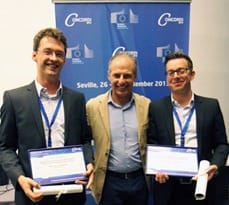
The CONCORDi-2013 Scientific Committee granted the CONCORDi-2013 Best Paper Award to the best selected work presented at the 4th European Conference on Corporate R&D and Innovation which took place on 26-27 September 2013 in Seville. The paper "Dynamic financial constraints and innovation: evidence from the UK innovation surveys", authored by Henry Lahr and Andrea Mina of the Centre for Business Research, has been prized for the originality, the scientific rigour and the policy relevance with which the authors deal with the complex relationship between the firm's financial constraints and its innovation. As the main result of the paper, the financial constraints experienced by the firms analysed do not seem dampen their R&D and innovation, while R&D activities and innovation, especially product and new-to-market ones, both make the firm more financially constrained. The attention of policy makers is drawn to the financial constraints that persist and gets even intensified when the firm innovates and enters the stage of its innovation diffusion. The policy support to this first stage is at least as important as that to innovation as such, especially with respect to SMEs, which often miss the capabilities to fully exploit their innovative outcomes. The prize was announced and granted…

The National Centre for Universities and Business (NCUB) has announced the appointment of Professor Alan Hughes, Director of the Centre for Business Research (CBR), as one of NCUB's first Senior Research Fellows. Professor Hughes, widely regarded as a world leading thinker on innovation, will primarily focus on the annual State of the Relationship report which NCUB will publish examining the landscape for business-university engagement. He will also oversee research for the Growing Value Programme on increasing the impact of the UK’s innovation systems. Commenting on the NCUB's three new appointments, Chief Executive Dr David Docherty said: I am delighted to welcome Aaron Porter to our senior management team and Professor Alan Hughes and Michael Stevenson as our first Senior Research Fellows. The role of NCUB in advancing the state of university – business engagement is crucial, and these appointments allow us to ensure we are tapping into the expertise of world leading researchers and business leaders who understand how our work can be of benefit to both the university and business communities. Professor Alan Hughes is Director of the Centre for Business Research (CBR) and Margaret Thatcher Professor of Enterprise Studies at Cambridge Judge Business School, and a Fellow of…

In this note Bill Martin and Bob Rowthorn of the Centre for Business Research (CBR) respond to the recent critique by Goodridge, Haskel & Wallis of their 2012 study of Britain's productivity puzzle, Is the British Economy Supply Constrained II? A Renewed Critique of Productivity Pessimism. They show that a correct reworking of the latest official data on changes in labour composition overturns Goodridge, Haskel & Wallis's main criticism. They also question the strength of the empirical evidence offered by Goodridge, Haskel & Wallis in support of their alternative explanations of the productivity puzzle. Follow the debate Read the original study, Is the British Economy Supply Constrained II? A Renewed Critique of Productivity Pessimism, by Martin & Rowthorn, May 2012 Read the critique "Can intangible investment explain the UK productivity puzzle?" by Goodridge, Haskel & Wallis, National Economic Review, April 2013 Read the response and comment by Martin & Rowthorn, July 2013…

A paper by Henry Lahr, Research Associate at Centre for Business Research (CBR), has been published in the European Accounting Review. The paper, "An improved test for earnings management using kernel density estimation", describes improvements on methods developed by Burgstahler and Dichev (1997) and Bollen and Pool (2009) to test for earnings management by identifying discontinuities in distributions of scaled earnings or earnings forecast errors. The main advantage offered by the bootstrap procedure over prior methods is that it endogenises the bandwidth selection step for kernel density estimation. Results for scaled earnings and earnings forecast errors in US firms over the period 1976-2010 show that significance levels found in earlier studies are greatly reduced by the new test procedure, often to insignificant values. Discontinuities cannot be detected in analysts' forecast errors, while such findings of discontinuities in earlier research can be explained by a simple rounding mechanism.…
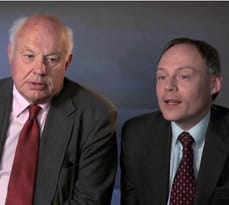
The Cadbury Archive at Cambridge Judge Business School has been completed with the addition of copies of all the speeches on corporate governance made by Sir Adrian Cadbury, Chairman of the UK Committee on the Financial Aspects of Corporate Governance. The Archive, established in 2010 and part of the Cambridge Corporate Governance Network (CCGN), is a major source for researchers into corporate governance. [vimeo id="71511170"] Dr Ian Jones of the University of Oxford and Dr Michael Pollitt of Cambridge Judge Business School lead the Ethics, Regulation and Globalisation project at Cambridge's Centre for Business Research (CBR). They argue that the governance laid down in the Cadbury Code has been interpreted too narrowly and the human side has been missed.…

The Centre for Business Research (CBR) and the UK Innovation Research Centre (UK~IRC) have released a new report, The Dual Funding Structure for Research in the UK: Research Council and Funding Council Allocation Methods and the Pathways to Impact of UK Academics. The report, commissioned by the Department for Business, Innovation and Skills (BIS), analyses the links between research performance, research funding models and the knowledge exchange activities and research motivation of academics in the UK. It looks at the UK system of dual funding support in which university research funding is provided by both institutional block grants from the Funding Councils based on quality assessment exercises and by funding through peer reviewed competition from the Research Councils. The report provides a statistical analysis of the dual funding system and how it has changed since the 2001 Research Assessment Exercise (RAE). The report also looks at the constraints that UK academics face when engaging with organisations outside their universities. It provides a detailed statistical analysis of the pattern of impact pathways of UK academics.…

Research findings on achieving long-term economic recovery The Re-igniting Growth report examines some of the challenges the UK faces after the economic downturn and explores a range of initiatives or challenges to policy that could help kickstart growth. The report includes a series of interviews with key academics funded by the ESRC, including Dr Andy Cosh, Assistent Director of the Centre for Business Research (CBR). As well as giving the recession historical context, many of the interviews take unconventional approaches to a range of issues and provide objective – and sometimes controversial – responses to the economic problems the UK is experiencing.…

In 2011 the Enhancing Value Taskforce was launched by the Council for Industry and Higher Education (CIHE) in conjunction with the UK~IRC to answer the question: "How do we make the most of the UK research base?" This new report, Growing Value: Business-University Collaboration for the 21st Century, is the last in a series of four from the Enhancing Value Taskforce that has looked into enhancing the innovation and the productivity impact of UK R&D.…

"Intervene or stand back – what should be the industrial strategy for the UK?" This was the topic of a debate organised by The Foundation for Science and Technology at the Royal Society. The three invited speakers were Sir John Parker, President of the Royal Academy of Engineering, the Right Honourable David Willetts MP, Minister of State for Universities and Science, and Professor Alan Hughes, Director of the Centre for Business Research (CBR). An audience of around 140 guests were invited with a background from business, parliament, Whitehall officials, the research community and guests with a special interest in the theme of the debate.…

The report from the Heseltine Review published today, No Stone Unturned in Pursuit of Growth, looks at ways of making the UK economy more competitive – recommending a National Growth Council and distributing funds locally rather than through central government as some of the measures. Other recommendations include "long term stability of the core funding of science and research", a higher degree of collaboration between universities and employers to encourage placements, and partial sponsorship of student fees from firms in return for a fixed employment period after graduation. Despite a policy focus on technology spin-offs from research, it is actually one of the least common forms of external knowledge exchange activity compared to interaction based on personal contacts, community and problem-solving. An ESRC-funded research project by the Centre for Business Research (CBR), looking at university-industry knowledge exchange, suggests that firms' motivations to interact with universities – rather than being restricted to technology development – are concerned with other aspects of management and business performance, such as service development, human resource management, training and marketing.…

The Centre for Business Research (CBR), based at Cambridge Judge Business School, is delighted to announce that Kate Barker CBE has become the new Chair of its Advisory Board. With a wealth of experience as a highly respected business economist, Kate’s main priority is to help translate the CBR’s research into policy and practice. She is currently a Senior Adviser to Credit Suisse and a non-executive director of three businesses. Within the public sector, she is a non-executive member of the UK Government’s Office for Budget Responsibility and Chair of the Northern Ireland Economic Advisory Group. Kate was a member of the Bank of England’s Monetary Policy Committee (MPC) from 2001 until May 2010. During this period, she also led two major policy reviews for Government on housing supply and on land use planning. Before joining the MPC, she was Chief Economic Adviser at the CBI, and prior to that Chief European Economist at Ford of Europe. Former Chair Matthew Bullock commented: In the last 10 years, the Centre for Business Research has built a fantastic record of cross-disciplinary research on the growth of small and medium-sized companies, in the UK, the US and Europe, on evidence-based developments of Innovation…

The Council for Industry and Higher Education (CIHE) and the UK Innovation Research Centre (UK~IRC) Enhancing Value Taskforce has published the second major report in the series arising from their research. The new report by Alan Hughes and Ben Martin, Enhancing Impact: The Value of Public Sector R&D, surveys a wide range of macro- and micro-economic literature on the way in which publicly financed R&D in the university sector is associated with socio-economic impacts. It provides a critique of studies focusing on rate of return calculations and argues for an approach using richer narrative based approaches emphasising intermediate outcomes. The report emphasises the extent to which socio-economic outcomes emerge only with long time lags and are frequently heavily skewed so that a handful of the most successful impacts arise from a small proportion of total funded research and are heavily dependent on complementary investments outside the university system. Find out more Download the report Enhancing Impact: The Value of Public Sector R&D Visit the Centre for Business Research (CBR) website…

Macroeconomist Michael Kitson says economics needs to be more humble and more relevant! [vimeo id = 47996538] The years 2010 – 2020 will be a lost decade for the world economy predicts leading economist Michael Kitson, who says a 'paradigm shift' in economic thinking should follow the doldrums of recession. He warns that despite limited growth within the BRIC economies there is potential for very poor global performance over the coming decade. What is needed in the world economy and individual countries like Britain is high level of aggregate demand and continued investment in new technology and innovation coupled to a renewed approach to economic thinking. "We shouldn't think that economics is a science that's fixed. Economics likes to think of itself as a science like physics – it's not. It's about behaviour. It's about why firms do what they do and why individuals do what they do. We have seen shifts in the past often following big seismic shifts to the economy. "The great depression of the 1930s ushered in Keynesian economics. The stagflation, stagnating economy high inflation of the 1970s, ushered in new thinking – monetarist economics. We've now got this world depression, world stagnation; it's time to…

Internationally renowned innovation expert Professor Alan Hughes has been appointed as the Queensland Government Innovator in Residence, based at the University of Queensland Business School. Professor Hughes is the Margaret Thatcher Professor of Enterprise Studies at Cambridge Judge Business School and Director of the Centre for Business Research (CBR) at the University of Cambridge, Director of the UK Innovation Research Centre (UK~IRC), and a UQ Business School Honorary Professor. Professor Mark Dodgson, Director of the Technology and Innovation Management Centre at UQ Business School, said: "Through lectures and presentations to government and business, Alan will draw on his world-leading research on issues of great importance to Queensland and Australia, such as: How are small firms encouraged to grow? What can universities and businesses do to better work together? Which government policies encourage innovation? This is a great initiative from the Queensland Government, and we are very pleased that we have attracted such an eminent authority to this important position." Highlighting the relationship between UQ Business School and the Queensland Government, Professor Hughes will be delivering a high-profiled public lecture entitled "The Myth of the Ivory Tower: Universities and the Wealth of the Nation". This lecture will be held at UQ…

A project on Labour Law and Poverty Alleviation in Low- and Middle-Income Countries will be funded under the joint ESRC/DFID Joint Scheme on International Development (Poverty Alleviation) from January 2013. The aim of the project is to develop a diagnostic tool or template to assist policy makers and regulators involved in labour law reforms in developing countries. The project will be directed by Professor Simon Deakin of the Centre for Business Research (CBR), working with Shelley Marshall of Monash University, Colin Fenwick and Corinne Vargha of the International Labour Office, Geneva, and Ajit Singh of the CBR. The research will take the form of case studies to be conducted in four countries (Cambodia, China, India and South Africa) and econometric analysis of data on a number of legal and economic indicators. The work will be carried out with the collaboration of local research partners in the case study countries. Research on Law, Development and Finance in Rising Powers will begin in April 2013, under the auspices of the ESRC's research programme on Rising Powers and Interdependent Futures. This project will examine the role of law in economic development in the 'rising powers' of Brazil, China, India and Russia. Specifically, it…

The UK~IRC hosted a two-day conference on Open Innovation on 25-26 June 2012 at Imperial College London to mark the 10th anniversary of the publication of Professor Henry Chesbrough's Open Innovation: The New Imperative for Creating and Profiting from Technology. As a result of the conference a special issue of the journal Research Policy will be published entitled "Open Innovation: New Insights and Evidence", with guest editors Henry Chesbrough, Ammon Salter, Wim Vanhaverbeke and Joel West, working in conjunction with Research Policy co-editor Ashish Arora. Topics for the conference included: How does the use of open innovation impact the capabilities of the firm to engage in business venturing and strategic renewal? What environmental and internal factors trigger companies to engage in open innovation? What are the performance implications of open innovation? Under what conditions do the costs of open innovation exceed the benefits? How have patterns of open innovation changed over time? What synergies are available by combining inbound and outbound modes of innovation? How should open innovation be applied in new ventures and small and medium-sized companies? How does open innovation change the role of intellectual property in a firm? What the conceptual and empirical limitations of prevailing models…

The House of Commons Select Committee agreed on 14 December 2011 to launch a new inquiry: Bridging the "Valley of Death": Improving the Commercialisation of Research. Written evidence The Committee invited written submissions on the terms of reference by February 2012. The Centre for Business Research (CBR) and UK Innovation Research Centre (UK~IRC) submitted evidence, as did CBR's Senior Research Fellow David Connell. Read the written evidence submitted by the Centre for Business Research (CBR)Read the written evidence submitted by David Connell Oral evidence Oral evidence in April included David Connell, Co-Founder of TTP Ventures and Senior Research Fellow at the Centre for Business Research/UK Innovation Research Centre, University of Cambridge Judge Business School, University of Cambridge; and Matthew Bullock, Chairman of both CBR and UK~IRC. Read the uncorrected transcript of the oral evidence held on 18 April 2012Read the uncorrected transcript of the oral evidence held on 25 April 2012Watch a video of the oral evidence held on 18 April 2012Watch a video of the oral evidence held on 25 April 2012…

Misc news
The British economy: where to now?
Is this British economy in danger of slipping into a permanent state of stagnation because of failing private sector confidence and weak demand, or is it, as many policy makers believe, constrained by deep-seated structural defects? Despite the weakness of the economy, the Office for Budget Responsibility (OBR) reckons that national output was only 2.5 per cent below the economy's potential at the end of last year. A new research report published today challenges the view of supply-side pessimists like the OBR and argues that the economy is suffering from a self-perpetuating effective demand failure. The report, Is the British Economy Supply Constrained II? A Renewed Critique of Productivity Pessimism, by authors Bill Martin and Bob Rowthorn of the Centre for Business Research (CBR), follows two previous reports by Bill Martin, in April 2010 and July 2011. The new report brings fresh evidence to bear on the reasons why Britain's labour productivity has fallen short and whether the economy's capacity has been left severely impaired by the banking crisis. The authors strongly challenge consensus estimates of the size of the economy's spare capacity; the OBR's estimate of the cyclical component of the budget deficit, and more generally the belief of…

Following a workshop that was co-organised by the UK Innovation Research Centre (UK~IRC) and the Cambridge Journal of Economics (CJE) on 'Universities and the Knowledge Economy', a special issue of the journal has been published. The scholars' papers reflect on the challenges facing universities and the implications for future developments and public policy. The full special issue of the journal is available online. Papers include: John Goddard, Douglas Robertson, and Paul Vallance: "Universities, technology and innovation centres and regional development: the case of the North-East of England" Ben R. Martin: "Are universities and university research under threat? Towards an evolutionary model of university speciation" Valentina Tartari, Ammon Salter & Pablo D'Este: "Crossing the Rubicon: exploring the factors that shape academics' perceptions of the barriers to working with industry" Simon Mosey, Mike Wright & Bart Clarysse: "Transforming traditional university structures for the knowledge economy through multidisciplinary institutes" Alan Hughes & Michael Kitson: "Pathways to impact and the strategic role of universities: new evidence on the breadth and depth of university knowledge exchange in the UK and the factors constraining its development" Mark Dodgson & Jonathan Staggs: "Government policy, university strategy and the academic entrepreneur: the case of Queensland's Smart State Institutes"…

Video
Rethinking economics
Macroeconomist Michael Kitson of Cambridge Judge Business School compares the current global recession to the Great Depression of the 1930s and feels that austerity is here for a long time unless there is a change in economic policy, globally, as well as in the UK. [vimeo id=39047657] "That may seem a big challenge but what we’ve seen in the past is that major shocks such as a major economic crisis have lead to a rethinking of the way we think economics works and a rethinking of economic policy." Similarities between this present recession and the Depression of the 1930s include scale, magnitude and global scope as well as similar economic policies. "That led to a revision of economic policy – the Keynesian economic policy – which said that government can help capitalism work. The Keynesian revolution kicked in during the1950s and 60s as a response to the Great Depression. "We had a policy response, we had a change in economics, we had government saying we can help manage the economy and the 50s, 60s and the early 70s were the global age of capitalism. We had rapid growth of the world economy and low levels of unemployment. "We need to…

Podcasts
Rethinking economics
A highly respected macroeconomist says a regime change in economics is needed to haul the country out of austerity and ensure long-term growth Macroeconomist Michael Kitson of Cambridge Judge Business School compares the current global recession to the Great Depression of the 1930s and feels that austerity is here for a long time unless there is a change in economic policy, globally, as well as in the UK. "That may seem a big challenge but what we’ve seen in the past is that major shocks such as a major economic crisis have lead to a rethinking of the way we think economics works and a rethinking of economic policy." [soundcloud id='41874115'] Similarities between this present recession and the Depression of the 1930s include scale, magnitude and global scope as well as similar economic policies. "That led to a revision of economic policy – the Keynesian economic policy – which said that government can help capitalism work. The Keynesian revolution kicked in during the1950s and 60s as a response to the Great Depression. "We had a policy response, we had a change in economics, we had government saying we can help manage the economy and the 50s, 60s and the early…

Radical changes to the UK's immigration policy are a 'kneejerk' reaction to the economic crisis warns leading economist Michael Kitson As the Government prepares to announce an overhaul of the UK's immigration policies, a leading economist has warned that raising controls now may adversely affect the country's economic recovery. Cambridge Judge Business School's Michael Kitson, Senior Lecturer in International Macroeconomics, feels that changing the immigration policy is a 'kneejerk' reaction to the economic crisis. [soundcloud id='37349976'] "We need to take a longer view here. The long-term concern is where economic growth is going to come from in the future, particularly in the UK. We have a very small manufacturing sector and we cannot rely on financial services in the future." Asked where he believes economic growth will come from, he suggests it must come from innovation and innovation within new sectors of the economy such as high technology manufacturing, through new services, or creative industries. "We need innovation for long-term growth, and innovation requires talented people and talented people come from all around the globe. If you put immigration controls up now you may be affecting innovation and long-term growth in the future."…

Members of the Centre for Business Research (CBR) contributed to the final conference of the FP7 FINNOV project (Finance, Innovation & Growth), which focused on the need for finance to be reformed so that it serves innovation and value creation – rather than innovation serving finance and too much value destruction. FINNOV's motto is "finance for creative destruction not destructive creation". The conference opened on 1 February 2012 at the House of Commons in Westminster. CBR's Professor Alan Hughes and Professor Stan Metcalfe were among those debating the topic "Driving the post-crisis recovery". Watch a video of the debate: The next day, at the Italian Cultural Institute in London, CBR's Dr Andrea Mina was one of the speakers on the subject "Venture capital and public research: where are the Googles?" Watch a video of his presentation:…

UK~IRC Innovation Summit 2011 – Growing through Innovation 26 November 2011 The Innovation Summit, UK~IRC's annual one day conference for practitioners, policy-makers and academics, took place on 25 November 2011 at IBM Hursley in Winchester. It was a chance to debate hot topics in innovation and share best practice. This year's event, entitled "Growing through Innovation", united the latest academic research with real-world business concerns, to provide evidence-driven discussions on using innovation to sustain growth. The British economy: as good as it gets? 18 July 2011 Has Britain's productivity been permanently and drastically impaired by the banking crisis? And does this mean that the economy has already returned to near normal levels of capacity utilisation? Many policy makers say yes. A new research report challenges the evidence and cautions against excessive policy tightening that may risk a vicious spiral of weaker demand and weaker supply. The report Is the British Economy Supply Constrained? A Critique of Productivity Pessimism by Bill Martin, Centre for Business Research, follows on from his April 2010 study and takes a detailed look at the reasons why Britain's labour productivity has fallen short. He finds policy makers' structural explanations unconvincing. Bill Martin argues that productivity weakness…

Professor Hughes re-appointed as member to the Prime Minister's Council for Science and Technology 16 December 2010 The Prime Minister today re-appointed five members, including Professor Alan Hughes, appointed four ex-officio members, and launched the recruitment of up to around ten new members to the Council for Science and Technology (CST). The appointments will commence on 1 January 2011 when current members' appointments expire. The CST is the UK Government’s top-level advisory body on science and technology policy issues. It reports directly to the Prime Minister. Find out more Visit the Gov.uk website to read more about the Council for Science and Technology reappointments Higher Education on Regional Economies Research Initiative Conference 18 November 2010 Professor Alan Hughes and Mr Michael Kitson both spoke at the Higher Education on Regional Economies Research Initiative Conference that took place in Edinburgh on 16-17 November 2010. Professor Hughes discussed the phenomenon of investment in higher education being seen as a route to economic recovery. Michael Kitson talked about the impact of expenditure cuts in UK higher education and the implications for society and long-term economic growth, and highlighted the extensive knowledge exchange taking place between academics and the private, public and third sectors.…
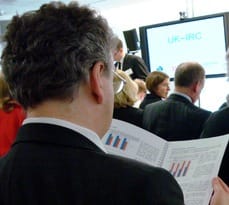
22,000 academics speak: results from the largest survey of academics 20 October 2009 On 20 October 2009 the UK Innovation Research Centre (UK~IRC) launched the results of the latest CBR research on how British academics interact with businesses and other sectors of the economy at NESTA. The results are from the largest survey of academics undertaken in the UK – with over 20,000 respondents. The research reveals: that although there is significant interaction between the science base and business, there are also significant 'hidden' interactions encompassing a range of other academic disciplines; that links between business and academia are not just about 'technology transfer' but involve a broader process that is best encapsulated as 'knowledge exchange'; that very few academics are involved with creating spin-outs, licenses or patents, instead the most frequent forms of knowledge exchange involve informal advice, joint publications, consultancy and a wide range of people based activities (such as involvement in networks and employee training); that there are significant interactions involving the third and public sectors. The research presented by Professor Alan Hughes and Mr Michael Kitson is based on a research project (RES-171-25-0018) carried out with their colleagues Maria Abreu and Vadim Grinevich at the CBR.…
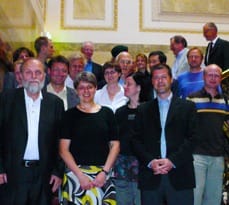
Innovation systems, innovation policy and the future of university-industry knowledge exchange 7 August 2008 On 14 August 2008 Professor Alan Hughes will be giving a public lecture presented by the National Academies Forum at the John Curtin School of Medical Research in Canberra. The presentation will provide an analysis of the nature of university-industry knowledge exchange in innovation systems. Workshop in honour of Professor Dennis C. Mueller 26 June 2008 A workshop entitled "The Economics of Corporate Governance & Mergers" was held in honour of Professor Dennis Mueller on occasion of his formal retirement in Vienna on 20-22 June 2008. Dennis has been a CBR research associate for many years and has been a project leader on "Corporate Governance & Investment: An International Research Network" within the CBR programme. He will continue in this role and is actively involved in the coordination of the Corporate Governance Network in which the CBR is a partner. The workshop was held in Vienna's Haus der Industrie. Find out more Visit Professor Dennis C. Mueller's profile on the University of Vienna website Dr Andrea Mina wins DRUID Best Paper Award 2008 21 June 2008 Dr Andrea Mina, who was nominated for the DRUID Best…

The contribution of services and other sectors to Australian productivity growth 1980-2004 30 November 2007 A new report by the CBR, commissioned by the Australian Business Foundation, looks at Australia's productivity performance from 1980 to 2004. There has been a clear acceleration in the growth of labour productivity in Australia in the 1990s. From 1992 to 2004 labour productivity grew at an annual rate of 2.3 per cent compared to 1.6 per cent observed for 1980-1992. The analysis of productivity growth acceleration reveals that nearly all of the post-1992 acceleration can be attributed to the performance of just three services sectors: financial intermediation, wholesale trade and other business activities not elsewhere classified. The remaining sectoral contributions effectively cancel each other out. The results demonstrate a similar pattern of contributions to productivity growth acceleration to that observed for the US in the McKinsey Global Institute reports for the periods 1995-2003, with services sectors playing a dominant role in both economies. This is particularly true in relation to wholesaling and financial intermediation. It is notable that retailing has not played a significant part in the Australian context. In relation to the overall sectoral concentration of productivity growth acceleration, the picture is more…

What helps business absorb knowledge and does this capacity vary across the regions of the UK? 1 December 2006 New research findings will be presented by Michael Kitson, Research Associate of the Centre for Business Research and University Lecturer in International Macroeconomics at Cambridge Judge Business School; Vadim Grinevich, CBR; Maria Abreu, CMI; and Maria Savona, CMI, at a DTI Conference which will be held at the British Academy on 1 December. The work provides new empirical evidence on the role of firms' absorptive capacity and regional differences in innovation performance in UK. The work is based on an in-depth analysis of two different databases the Fourth Community Innovation Survey (CIS4) and the 2004 Survey of Small and Medium-Sized Enterprises from the Centre for Business Research (CBR) at the University of Cambridge. The results indicate that there are important spatial differences in innovation levels, and many of these differences can be explained by spatial variations in firms' absorptive capacity. The research indicates that differences in managerial practices such as job rotation have a significant effect on product but not on service innovation and employee training practices have a significant impact on service and process but not on product innovation…

The Wal-Mart model: is it sustainable? 1 December 2005 Wal-Mart has just been the subject of a week of events in the US run by a campaign group concerned about Wal-Mart’s corporate citizenship and its treatment of employees. Now new research from the Centre for Business Research at Cambridge University contrasts the company’s business practices unfavourably with another large retailer – IKEA – and warns of the impact of “discount prices based on low living standards” on both domestic and global production systems. Wal-Mart’s “single-minded pursuit of the bottom line”, or IKEA’s “low cost, but not at the expense of product quality, social or environmental responsibility” – which variety of capitalism is sustainable in the long run? And whose business practices are better for these retailers’ host communities, employees and suppliers, and ultimately the companies themselves? These questions are posed in a study just published by the Centre for Business Research at Cambridge University. In a working paper entitled ‘The Export of National Varieties of Capitalism: the Cases of Wal-Mart and Ikea’, four researchers interested in corporate governance compare the business practices of Wal-Mart – the world’s largest retailer and America’s largest private employer – and IKEA, the world’s largest…

CBR research casts new light on UK innovation process 25 November 2004 CBR research that was presented at a major conference in Edinburgh on November – and covered by the Financial Times the same day – has shed new light on the role of universities in the UK innovation process. The first findings from a new study comparing the innovative behaviour of small and medium-sized companies in the US and the UK show that the number of UK companies that have relationships with universities is greater than has previously been thought, and more than in the US. The International Innovation Benchmarking research, being conducted by the CBR's Professor Alan Hughes and Dr Andy Cosh in collaboration with Professor Richard Lester of the Massachusetts Institute of Technology, is a study that will ultimately quiz four thousand companies of all sizes in the US and the UK to create the first comparison of their innovative efforts and activities, and their resulting performance. The study is being funded by the Cambridge-MIT Institute, and the first findings from it were unveiled on 30 November at 'Exchanging Knowledge – Boosting Competitiveness', the Cambridge-MIT Institute's National Competitiveness Summit. The study found that two-thirds of UK companies…

Learning from Enron; what makes entrepreneurs tick; and the saga of Britain's managerial skills shortage… 17 October 2003 Why we might be learning the wrong lessons from the collapse of Enron; what Britain's high-tech entrepreneurs are really like; and the curious, post-War history of why institutional investors began buying shares in UK companies at a time when the skills of the managers running them seemed seriously inadequate… These are just three of the issues raised in new Working Papers published this week by the Centre for Business Research (CBR) at the University of Cambridge. The seven papers raise a number of issues for policy-makers in the fields of enterprise, and corporate governance. These range from warning that high-tech small firms cannot be treated identically, since they do not all follow the same growth paths and ambitions, to urging policy-makers to consider very carefully the real lessons of the collapse of Enron. After interviewing a number of high-tech entrepreneurs, the authors of The Beer Beneath the Froth (Working Paper 272) are warning industrial policy-makers not to get carried away with the idea that every small high-tech by usiness is set up by an ambitious young graduate with their eyes on fast…

The Cambridge Seminar on Financial Regulation 25-27 September 2002 The seminar brought together senior bank regulators from South East Asia to discuss the role played by financial regulation and the theory and practice of prudential regulation in an international context. Participants came from Indonesia, Malaysia, the Philippines, Thailand and Vietnam. Other guests included representatives of the World Trade Organisation, the UK Financial Services Authority, and the Bank of England. Seminar presentations stressed the importance of the practice of financial regulation for economic policy and the links between micro risk, macro contagion and economic performance. The presentations also emphasized the importance of institutional context focusing, in particular, on the latest international developments. Lord Eatwell opened the seminar with a keynote speech on the purposes of financial regulation and the relationship between regulatory institutions and formation of macroeconomic policy. His presentation focused on the threats to systemic stability and the need for an international response to the regulatory challenge posed by internationalized financial markets. These points were reinforced in the subsequent presentation by Kern Alexander, who gave a critical evaluation of how the international framework for financial regulation has evolved so far, emphasizing how norms developed for and by the G10 are…

